A New Millennium, Y2K jitters and a world that did not end
The computers did not crash. The world did not end. And Uganda sailed smoothly into 2000.
MILLENNIUM Y2K BUG 2000
In the end, it was just another New Year's night, with the dancing, drinking, praying and fireworks that have come to characterise the annual celebration of a new year in Uganda. And on the morning of January 1, 2000, life simply went on as it always had.
It was something of an anti-climax. The months leading up to the turn of the millennium had been filled with chatter and anxiety about what would happen when the world went from the year 1999 to 2000.
Doomsday prophets had announced the end of the world, while scientists had for years been warning of the likely effects of the Y2K computer bug. Also known as The Millennium Bug, it was an expected computer glitch, arising out of the fact that the early computer programmers had set up computer software to read years as two digits, which meant, for instance, that the year 1994 was read simply as 94.
When the clock struck midnight on December 31, 1999, how would computer software be able to tell whether it was 1900 or 2000?
From hospitals to the transport industry and banking to telecommunications, there were jitters everywhere. And as the clock ticked to 2000, computer programmers around the world worked on solutions to avert the failure of the date and time-sensitive systems the world had come to rely on.
In Uganda, a national Y2K taskforce was established and as 1999 wound down, they addressed the country's fears and announced the readiness of the nation's systems to switch over to the new millennium without incident. "Uganda is Y2K compliant," a November 1, 1999 New Vision headline announced.
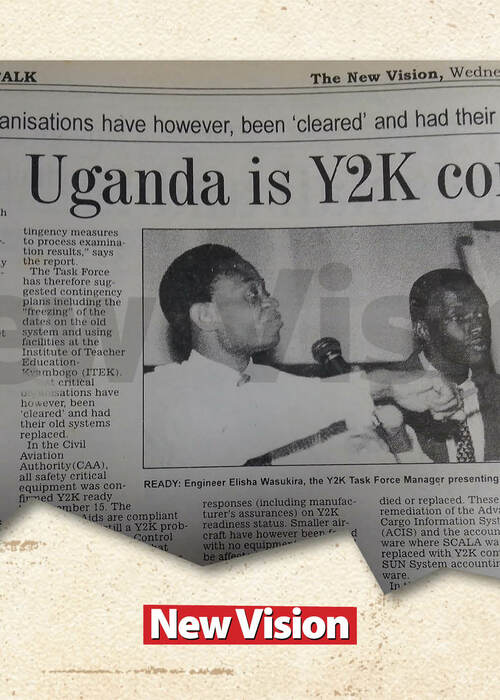 Uganda is Y2k Compliant A new millennium 2000
Uganda is Y2k Compliant A new millennium 2000
The assurances notwithstanding, no chances would be taken. The task force said the teachers' payroll had been prepared till January 2000 as a contingency, since teachers constituted the biggest percentage of public employees.
The national referral hospital, Mulago, meanwhile, announced that as the new year dawned it would switch off its most delicate and expensive machines. Deputy hospital director Dr. Gideon Kikampikaho said, "We shall switch off our automated medical equipment such as the radiotherapy unit. We shall also take care of specialised technology machines such as the computerised tomographic machine."
Dr. Kikampikaho said while all the machines in the hospital had been declared Y2K compliant by the national Y2K task force, extra care was being taken. "We are all anxious. Nobody knows exactly what is going to happen. We must adjust and accommodate any changes and eventualities," he said.
The hospital also put on standby a consultant surgeon, 11 doctors, 26 nurses and five auxiliary staff to handle emergencies.
Other organisations viewed as ‘critical' were put on 24-hour surveillance of their computer systems to monitor their transition. The national Y2K task force manager, Elisha Wasukira, said, "Although all the critical organisations are Y2K-ready, we shall monitor them closely for any eventualities and we shall notify government of any emergencies."
The Bankers Association also assured the nation of a smooth transition, but nonetheless announced that all banks would be closed on Friday, December 31, 1999 and Monday, January 3, 2000.
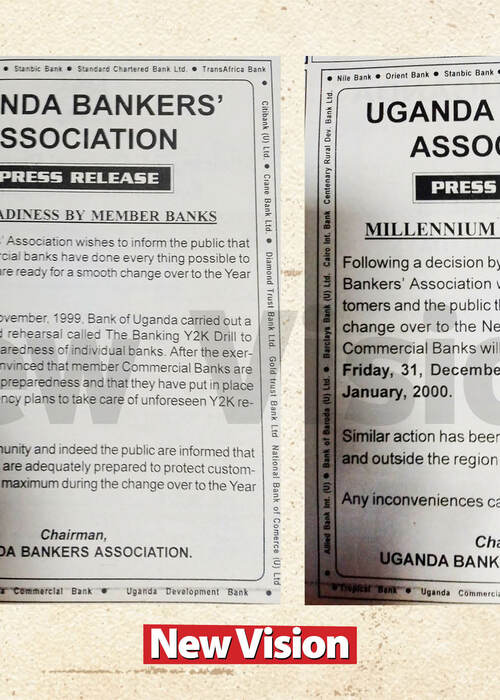 Uganda Bankers Association press release Y2K
Uganda Bankers Association press release Y2K
For a small section of Ugandans, Y2k was the least of their worries. The New Vision spoke to nine young Ugandans about their hopes for the new year. From ice cream and dolls to peace and good grades, they shared their hopes.
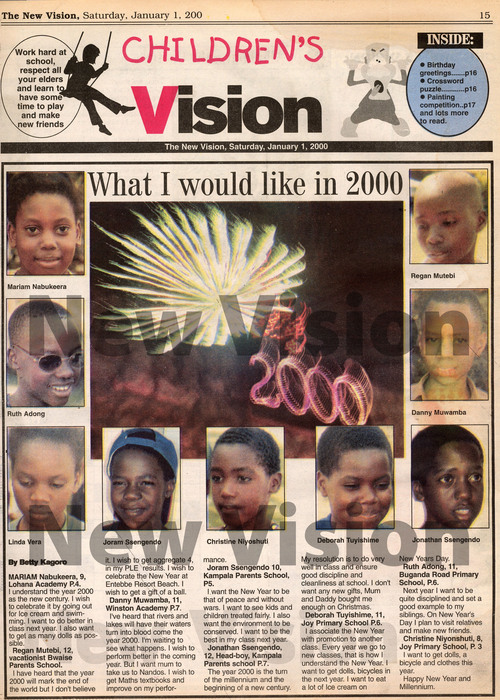 What I would like in 2000: The New Vision spoke to nine young Ugandans about their hopes for the new year.
What I would like in 2000: The New Vision spoke to nine young Ugandans about their hopes for the new year.
The government, meanwhile, suddenly declared December 31, 1999, a public holiday, although just a few years prior it had announced that all public holidays had to be approved by Parliament. These, though, were not normal times. The Undersecretary at the Ministry of Public Service, Winnie Kabogoza, said the holiday was special and followed a Cabinet decision. "The President has been away and just signed the instrument yesterday," she said.
The holiday was welcomed by many people who said it would give them time to prepare for the end of the 20th century and welcome the new millennium in style.
And welcome the millennium in the style they did. Casting anxieties aside, as night fell on December 31, 1999, Uganda came out to party. With ‘millennium events' having been advertised across the city and country, revellers were spoilt for choice.
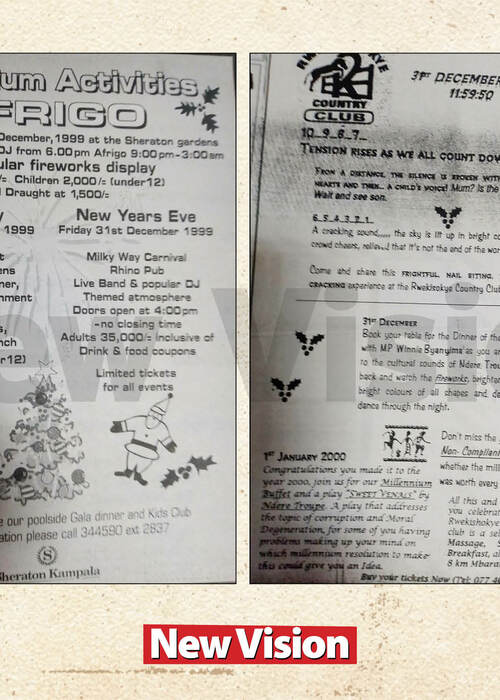 Millennium events advertised across the city and country, revellers were spoilt for choice.
Millennium events advertised across the city and country, revellers were spoilt for choice.
At the Lubiri, the palace of the Kabaka of Buganda, Congolese musician Awilo Longomba entertained a large gathering that included Kabaka of Buganda and his queen in an event dubbed ‘Ekibbittu Kyekyasa'.
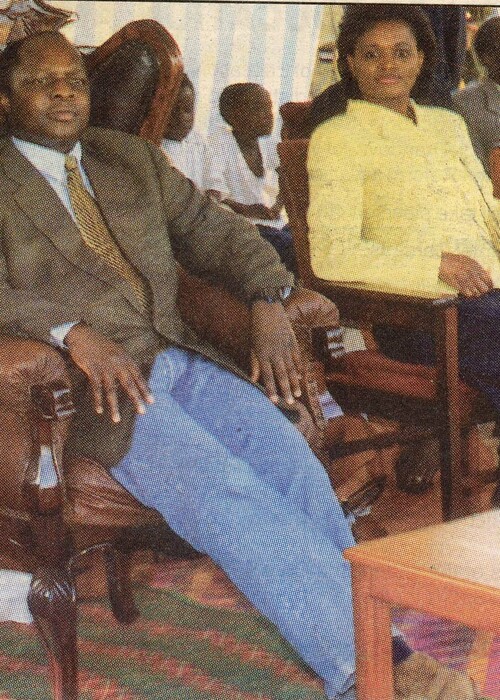 Kabaka and Nabagereka at the Millennium celebration at the Lubiri.
Kabaka and Nabagereka at the Millennium celebration at the Lubiri.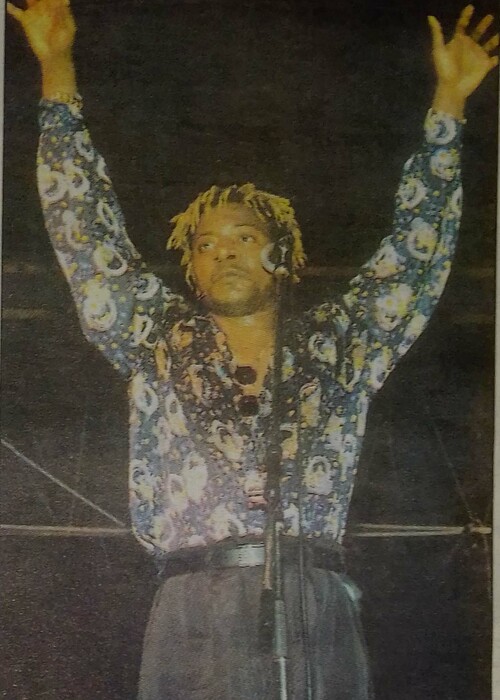 Awilo Longomba performs at the Lubiri, New Year's Day 2000.
Awilo Longomba performs at the Lubiri, New Year's Day 2000.
At the Kampala Sheraton Hotel, fireworks lit the sky as Afrigo Band's Obangaina played. And at the Lugogo Cricket Oval, 33 musicians, including Paulo Kafeero, Jimmy Katumba, and Steve Jean graced the stage at the Nile Millenium bash.
The computers did not crash. The world did not end. And Uganda sailed smoothly into 2000.
When the dust had settled and the books been reviewed, the National Y2k taskforce reported the cost of the smooth transition: sh4b. It was about 1 percent of Uganda's 3.5 trillion in GDP. The Reuters news agency, meanwhile reported that $600b had been spent worldwide to neutralise the millennium bug.